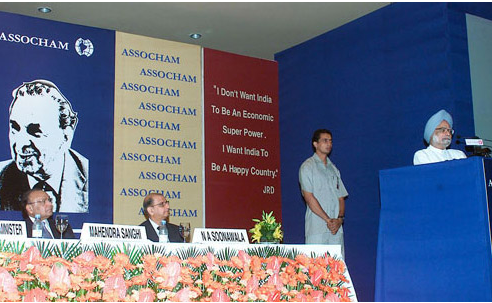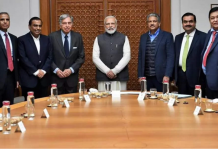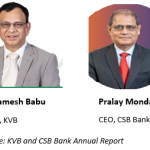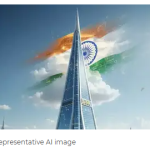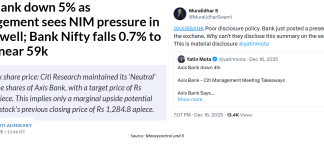Manmohan Singh’s Speech as Prime Minister, citing R.K. Hazari
Friends,
I am happy to be with you this morning. Let me begin by thanking the Associated Chambers of Commerce and Industry of India and Shri Hari Shankarji Singhania, Chairman of the JRD Tata Centenary Celebrations Committee, for inviting me to inaugurate the centenary celebrations for the Late J.R.D. Tata.
As you know, this is my first opportunity to meet with representatives of our national business since the recent elections. I would have liked to interact more often with captains of industry and trade but we are living through abnormal times. Never in the history of any government have the first 100 days been characterized by the daily turmoil that we have witnessed in this Parliament. I had to deal with many of these abnormal situations and that naturally kept me away from meeting people form various walks of life whose views and opinions I greatly cherish. I seek your cooperation in making a success of this experiment of building in our country a process that is inclusive, that involves more and more people in the process of decision making and gives them a sense of belonging. In many senses I think it is only fitting that I make this appeal to you at an occasion that allows me to pay tribute to Jehangir Ratanji Daddabhoy Tata – “JRD”, as we fondly remember him- who was truly one of the Titans of modern India.
For me personally, there is the added pleasure of the fact that the last time I had the privilege of holding public office, our government took the decision to confer the Bharat Ratna upon JRD Tata, making him the first business leader selected for our highest civilian honour. There is little doubt that JRD was an eminently suitable choice, as the tallest and most daring titan amongst the galaxy of business pioneers to have contributed to our country in the 20th Century. Along with entrepreneurs like GD Birla, Walchand Hirachand, and many other illustrious sons of India, JRD played a vital role in transforming an agrarian, colonized India into a modern, industrial Nation
Most of us are familiar with the remarkable life story of this extraordinary man. The fact that he joined Tata Steel at the young age of 21, and his meteoric rise to become Group Chairman at the age of 34 are part of this remarkable story. Barely twenty years later, the distinguished industrial economist, R. K. Hazari would write:
“The Tata complex contains the largest private sector company, Tata Steel, the largest cement company, ACC, the largest engineering company, TELCO, the largest group of power companies, Tata Power, Tata Hydro and Andhra Valley, the largest trading company under Indian control, Voltas, the largest insurance company, New India, and one of the largest groups of cotton mills, Tata, Ahmadabad Advance, Central India, Gokak and Swadeshi.”
For those of us who remember the 1950s, this is a very impressive list. However, besides playing an important part in the growth of these companies in the first two decades of his career, JRD also started India’s first commercial airline company and Asia’s first cancer hospital. He also found both the time and the ability to help Avabai Wadia set up the Family Planning Association of India� and to provide Homi Bhabha with the founding grant to establish the Tata Institute of Fundamental Research, thereby playing an important role in our quest for nuclear capability.
Friends,
When the government conferred the Bharat Ratna on JRD in 1992, we were motivated by considerations that went beyond the very substantial contributions of JRD to Indian business and enterprise. Indeed, JRD was more than just a chairman of Tata Sons. He was a true patriot, a great visionary, with a deep belief and faith in India’s destiny. who was cognizant of the wider social role of enterprise. He provided leadership to a new kind of corporate citizenship in India. JRD’s emphasis on values, on ethics, on investing in education, research, science, technology, health care and in improving the quality of life of ordinary people was a forerunner of the more recent concepts of “corporate social responsibility”.
As a student of economics in the 1950s and later as a practitioner in government, I was greatly impressed by the “Bombay Plan” of 1944. In the conceptualization of this document, JRD played an important role, along with G D Birla, Purushottamdas Thakurdas, Ardeshir Dalal and John Mathai. When we read it today, nearly 60 years later, we see how relevant many of the central propositions of the Bombay Plan remain. In those days, it was an unprecedented document. It is worthy of emphasis that nowhere in the developing world had a group of businessmen come together to draw up such a long-term plan for a country. The Bombay Plan laid great emphasis on public investment in social and economic infrastructure, in both rural and urban areas, it emphasized the importance of agrarian reform and agricultural research, in setting up educational institutions and a modern financial system. Above all, it defined the framework for India’s transition from agrarian feudalism to industrial capitalism, but capitalism that is humane, that invests in the welfare and skills of the working people. In many ways, it encapsulated what all subsequent Plans have tried to achieve .
Ladies and Gentleman,
We have come a long way since the days of the Bombay Plan. Many of the “pre-requisites” of industrialization and modernization have been put in place. India has emerged as a modern economy, an important industrial economy and a knowledge power. We have impressive achievements to our credit in the fields of space and atomic energy. However, in order to realize our full growth potential, we need to pay much more attention to the expansion and modernization of social and economic infrastructure, to increased investment in education and health and to the creation of capabilities that make us globally competitive. Our government is committed to building a competitive economy and a just society to enable us to regain our rightful place in the comity of Nations.
Our government believes that processes of wealth creation are essential for us to meet our commitment to eradicating poverty, and to realize the latter, we are dedicated to supporting the former. One of the “basic principles for governance” explicitly stated in the very beginning of the National Common Minimum Programme is a commitment to “ensure that the economy grows at least 7% – 8% per year in a sustained manner over a decade and more and in a manner that generates employment so that each family is assured of a safe and viable livelihood.” This requires an acceleration in the rate of growth of agricultural production to up to 4.0%. It requires industrial production growth rates of around 10% to 12%. It is easy to see that the two are inter-linked. I realize that for this to be feasible, it is of utmost importance that we create an enabling environment that rewards creativity, risk-taking and the spirit of enterprise and adventure.
Our government appreciates the challenges that we face in realizing these goals. We know that to deliver on our commitments, to generate the employment growth required to keep pace with the growth of the labour force, to reduce poverty and to find resources for new investment in agriculture, infrastructure, education and health, we must increase the rate of growth of capital formation in the economy.
You would recall that responding to reform initiatives of the early 1990s�symbolizing the air of optimism and confidence of that time–the ratio of gross domestic capital formation to gross domestic product hit a peak of 26.9% in 1995-96 and private corporate sector capital formation was over 9% of GDP. However, these ratios declined to around 23% and 6% respectively in recent years. This decline has been a distressing feature of economic growth in recent years. We must reverse this trend.� I commit our government to re-energising the economy’s growth engine, to recreating the policy and political environment required to boost investor confidence and enable an increase in private investment in the economy. In doing so, our government will draw inspiration from the efforts of pioneering spirits such as JRD and other entrepreneurs of his time, who achieved a remarkable amount despite the hostile conditions prevalent during the years of colonial rule.
To enable new investment, to generate higher growth in incomes and employment, we must unleash the full potential of individual initiative and enterprise. We must provide a new stimulus to the animal spirits of our entrepreneurs. We must create a social, political and economic environment in which budding entrepreneurs can realize their dreams. When enterprising and creative individuals create wealth, they create new employment opportunities and new hope for our collective future.
India has changed much since independence, Our Nation is proud of the achievements of our entrepreneurs.� In our own times, we have leaders of a new generation in established business families who are striking out anew. We have seen Ratan Tata giving shape to the production of an Indian car which can find markets abroad, which is a signal development that needs greater recognition. Business groups like Reliance, Ranbaxy and the Tatas themselves have been seeking global markets. We have an IT revolution of which Fakir Chand Kohli, Narayanamurthy and Azim Premji have been pioneers. In pharmaceuticals, the work and creativity displayed by the Ranbaxy Group, Dr Reddy’s Lab, Cipla and the Piramals is exemplary and worthy of emulation. There is much for us to celebrate about Indian enterprise in this centenary year of JRD.
Ladies and Gentleman,
�
I have repeatedly stated our government’s commitment to fiscal discipline and to improving public finances. I have also written to my colleagues in the Union council of ministers drawing their attention to improving the functioning of public sector enterprises. Our objective of increasing public investment in social and economic infrastructure cannot be met unless the Central and State governments pay attention to the improved management of public finances and public enterprises.
India has to be a major trading nation.� For that we need a competitive economy that works on the frontiers of scientific, technological and managerial knowledge. The trend of globalisation is an irreversible one. We cannot shy away from it. We must prepare ourselves for greater integration with the evolving world economy. The reality is that as markets integrate across the world, firms must become more competitive globally. To do so, firms need to be competitive domestically first. They must have world class capabilities, based on the use of modern science and technology. They need to invest in research and development, managerial skills and global economies of scale. We will facilitate this so that India becomes the home of multinational corporations of the future.
To enable this we must create world-class infrastructure. Over a decade after we first launched economic reforms, we still cannot say we are proud of our roads, our airports, our sea ports, our power supply, our railways, our urban infrastructure. There has been inadequate attention paid to the development of basic infrastructure of modern industrial development. This we are committed to reversing. In each of these areas we require public-private partnerships. The public sector alone cannot deliver what is required in a timely and competitive manner. Hence, the importance of such partnership.
The government will ensure that there is a regulatory framework that: (a) is transparent; (b) is independent of government and, therefore, provides an impartial balance between public sector and private sector suppliers; and,(c) is based on international best practice.
I have asked the Planning Commission to prepare a paper indicating what that regulatory structure should be for each area, like power, roads, ports, and so on. The paper will look at gaps in existing systems, comparing them with international best practice, and will recommend changes in existing policy, if necessary.
The government will closely monitor progress in all key infrastructure projects, including airports, power, telecommunication, roads and ports on a quarterly basis to ensure that targets are met. To this end, I am setting up a Committee on Infrastructure that I will chair myself. The Planning Commission will function as the executive arm of this Committee, identifying bottlenecks in policy implementation, guiding the relevant ministries to speed up implementation of projects and generating ideas for the Committee’s consideration. I have requested the Deputy Chairman to pay particular attention to this urgent priority of the government.
The acceleration of private investment is a function of infrastructure and incentives. The incentive structure is in fact more or less in place. The tax reform already undertaken as well as proposals in the pipeline like value-added taxation (VAT) have addressed the fiscal policy agenda that industry has been signaling for some time. I am aware of the need to further simplify the procedures for tax compliance and the finance ministry will address these and related issues in the next Union budget.
The industrial and tariff policy reform we initiated over a decade ago have addressed to some extent the demands of industry. The time has come for us to move ahead on the unfinished part of the agenda. Much of this, however, is in the realm of State governments. Further reform of industrial and tax policies, the efficient functioning of municipalities and renewal of urban infrastructure and the ending of the so-called Inspector Raj are all issues that State governments must address.
I am told, in China an industrial establishment is visited by just six inspectors: one each for monitoring of adherence to laws pertaining to taxation, environment, labour, workers’ health and working conditions, municipal laws and product quality. I believe in India many of you find your industrial establishments visited by over 30 inspectors.
This tyranny of over-inspection must end. I will be reconstituting the Prime Minister’s Council on Trade & Industry. One of the areas of focus for this council will be reduction of the Inspector Raj. Through this forum, I will be seeking your ideas and suggestions to carry this idea forward.
Ladies and Gentlemen,
I do not have to re-assure this audience about my commitment to economic reform and growth. However, I do so because I am fully aware of the apprehensions and anxieties that some of you entertain. Let me assure you that our government is committed to taking this country forward on the path of modernization and rapid industrialization, to making India a “Super Power of The Knowledge Economy”. This we must do by walking hand-in-hand with you. This we can do by creating the requisite social, political and economic environment. This we should do by allowing individual enterprise to blossom, to create wealth, to master new technologies and conquer new markets, while at the same time we create a society which is just, fair and equitable, a polity that is inclusive and an economy that is caring.
Business too owes an obligation to society. No one appreciated this better than JRD who invested liberally in socially useful activities. I urge you to consider what your obligations are today. In discovering opportunities to invest in socially useful projects, in creating new avenues of progress for the under-privileged, in investing in the less developed regions for the benefit of the marginalised sections of our society. Corporate social responsibility is not philanthropy. It is not charity. It is an investment in our collective future.
In the year of JRD’s birth centenary I commit our government to the ideals and objectives of building a modern, globally competitive and humane industrial economy that JRD and his generation of industrial pioneers so cherished. I want you, Ladies and Gentleman, to be re-assured that our government is committed to the growth and development of Indian business and enterprise. Equally, I seek your commitment in the building of a more humane, caring and just society.
In this we are partners. We must walk together on the road to well-being and prosperity.
I wish you all well. Thank you.

